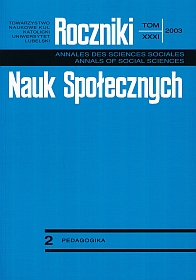Etos pedagoga
Abstrakt
The aim of the article is to define the act and process of education that is authentic and not exposed to manipulation, as well as to point to the areas of educational activity (of the teacher and educator) that are often deformed by distorting the pedagogical ethos. After making a distinction between the phenomena of education and manipulation the conditions are defined for educational activity, that is safely separated from activity whose aim is manipulation. Next the most important transgressions of the educator's ethos are presented. The most general of them are the following: ideological imposition on the pupil of the one and only idea of the reality, issuing from the educator's authority; and the lie that is the opposite of this – making all the truth about the reality relative. One may defend himself against such distortions of the ethos by making the pupil realize his responsibility for any truth he himself recognizes. Particular lies in the relation educator-pupil are the following: indoctrinating or flattering the pupil, imposing the rule of conformism on him, using him, underestimating the mission of the profession or vocation of the educator, and finally, corruption that consists in deriving material profits from being lenient towards the pupil. A separate chapter is devoted to lies told by the history teacher – who especially severely infringes the ethos of the educator of society. The main mechanisms are presented that are used by the historian for lying, and the means of defense are pointed to that boil down to making sure the data and assessments are objective. The last part of the article is devoted to the role of the educator's authority. False authority (several types are mentioned that have different sources) is differentiated from personal authority whose power comes from referring it to an absolute value (the truth or God).
Copyright (c) 2003 Roczniki Nauk Społecznych

Utwór dostępny jest na licencji Creative Commons Uznanie autorstwa – Użycie niekomercyjne – Bez utworów zależnych 4.0 Międzynarodowe.


